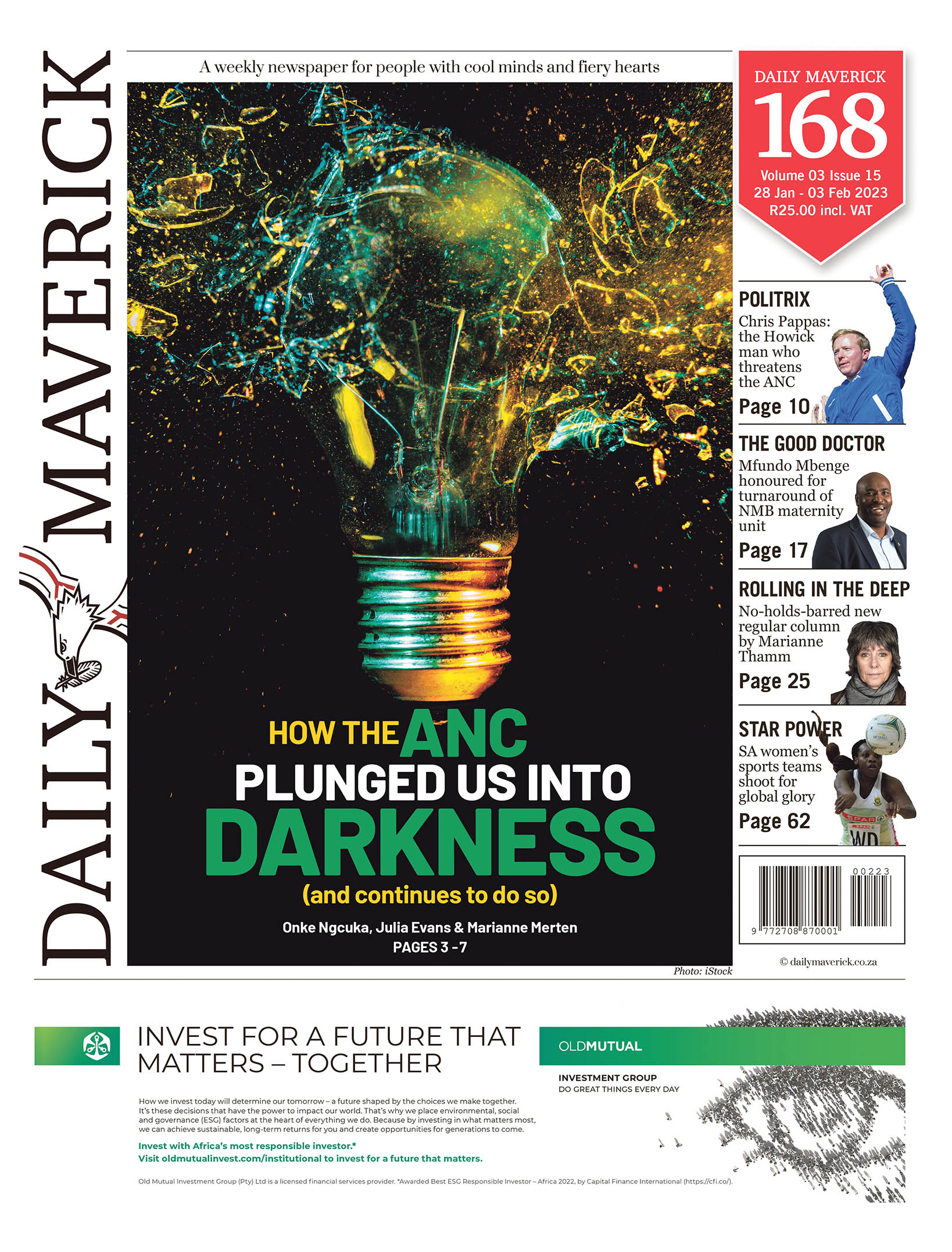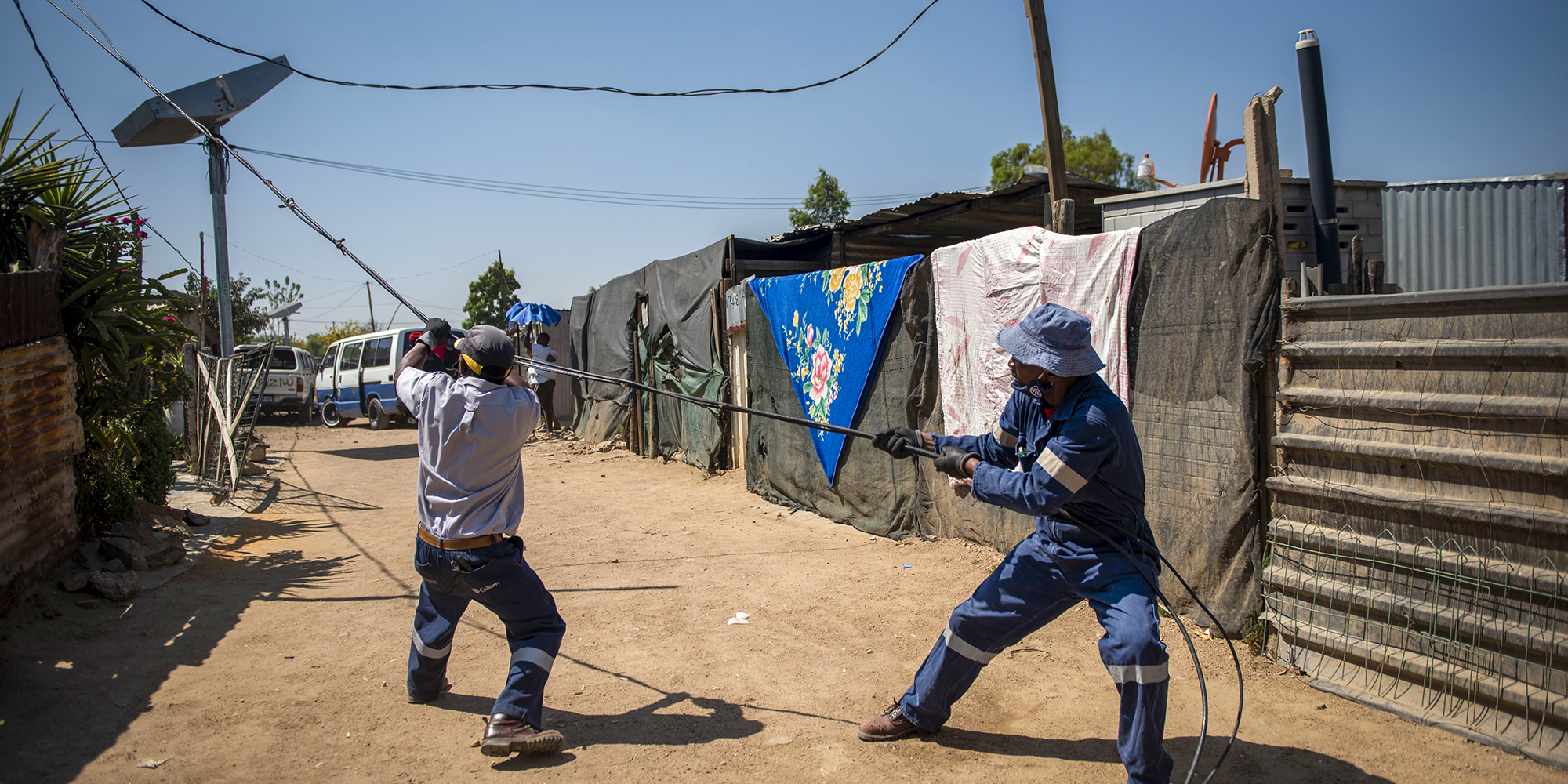The Enoch Mgijima Local Municipality in the Eastern Cape owes Eskom a whopping R890-million.
On any given day, the municipality’s social media pages are mostly filled with a long list of electricity outages owing to failing municipal infrastructure, load reduction (owing to the unpaid bill) and rolling blackouts. Sometimes residents have no electricity for days.
Daily cable faults and the refusal of contractors to work as a result of non-payment have become part of life in Komani.
Despite a directive from Treasury and several court orders against the municipal leadership to fix the problem, Executive Mayor Madoda Papiyana said the municipality is providing electricity at a loss.
“The municipality buys electricity for R30-million, and we get R14-million from selling the electricity, so we are losing R16-million. We are losing more than 60% of the electricity money because of tampering with meters and illegal connections by businesses and residents,” he said.
“The people stealing electricity are not only in the location but big businesses in town as well. I had meetings with businesses, and the only way to solve the electricity problems in Komani is for us to work together,” he said.
He said if the municipality were to collect the same amount of money that it uses to buy electricity, it would be in a different situation.
On Thursday, 26 January, a march protesting against extensive electricity outages in the town owing to faults that take a long time to fix, crumbling infrastructure and load reduction (because of the unpaid bills) turned ugly when the police fired rubber bullets at protesters.
Visit Daily Maverick's home page for more news, analysis and investigations
But Papiyana seemed unmoved.
“The majority of the people at the march are stealing electricity. Last week, we promised that we would fix the electricity and we did. We have separated the areas that used to have problems to try [to] reduce the load,” he said.
Meanwhile, the power has been off for a week, owing to a fault in the town’s biggest public hospital. Papiyana said that by the close of business on Thursday, Frontier Hospital would have electricity, but on Thursday evening DM168 established that this did not happen.
“We have an old electricity infrastructure and we are going to build another substation. We also have decided to stop using underground cables and start using overhead electricity,” he said.
Papiyana’s explanation for the municipality’s unpaid bill, however, contradicts what the provincial government said.
The Enoch Mgijima Local Municipality owes the most money in the province to Eskom.
MEC for Cooperative Governance and Traditional Affairs and former municipal manager Zolile Williams said the municipalities must ring-fence their electricity income and pay it to Eskom. But he admitted that they are fighting an uphill battle.
“The provincial government has for the past four years encouraged the municipalities who owe Eskom to honour their debts, but without success.”
The MEC for Finance in the province, Mlungisi Mvoko, estimates that municipalities in the Eastern Cape owe Eskom R2.7-billion. He said he was doing his utmost to get the municipalities to settle their electricity debt. Even National Treasury has been called in to talk to them.
“The National Treasury has issued circulars to municipalities to ‘ring-fence’ Eskom money in their budgets. This has proved to be an uphill battle,” he added.
In an answer to a parliamentary question, the Minister of Cooperative Governance and Traditional Affairs, Nkosazana Dlamini Zuma, said the national executive must intervene in terms of the Constitution if the provincial executive cannot or does not adequately do so.
She said the interministerial task team was leading a responsible citizenry campaign to educate consumers on the benefits of paying for municipal services and rates. She said intergovernmental dispute resolution facilitators have been appointed in all provinces to deal with intergovernmental disputes and to process and verify the amount of debt owed by organs of state to municipalities, and in turn the debt owed by municipalities to Eskom and water boards.
Enoch Mgijima Local Municipality is one of many in South Africa that do not pay their electricity bills. Municipalities owe Eskom about R50-billion in total.
This week, Eskom said the City of Tshwane’s electricity debt now stands at R1.4-billion. The City didn’t pay its entire November bill and didn’t pay for December. This, the Eskom statement said, “negatively impacts the liquidity, financial performance and sustainability of the power utility”.
The statement continued that Eskom has declared a dispute in terms of intergovernmental procedures about the unpaid bill.
“Eskom does not have the financial capacity to finance the City of Tshwane’s operations and calls on the City to do right by its residents and pay the bulk electricity account to enable Eskom to continue supplying electricity to the city.”
The City of Tshwane, however, hit back, saying that Eskom keeps on rejecting its payment plans.
“The City of Tshwane has taken note of the Eskom media statement regarding the amount … owed to the power utility by the municipality. We acknowledge the R1.4-billion arrear debt and we intend to make regular payments to service the account.
“Our finance team has consistently been engaging Eskom on a payment plan. As a City, we understand our responsibility to pay our creditors and … we continuously communicate with Eskom with a proposed payment plan to bring the account up to date. We must also acknowledge the adverse impact Eskom’s load shedding has on the City’s liquidity position. Our maintenance budget is spinning out of control as a direct impact of load shedding, but Eskom refuses to take responsibility for this,” the statement reads. DM168
This story first appeared in our weekly Daily Maverick 168 newspaper, which is available countrywide for R25.





